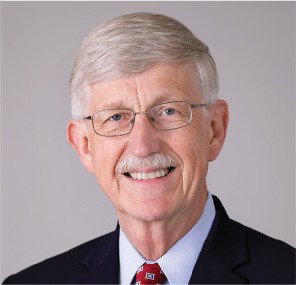As printed in Science
FRANCIS S. COLLINS
SCIENCE • 6 Jan 2022 • Vol 375, Issue 6577 • p. 123 • DOI: 10.1126/science.abn7743
Having just stepped down from serving three presidents over 12 years as director of the US National Institutes of Health (NIH), I am deeply grateful for the opportunity to have led this noble enterprise and to work with amazing people. Astounding progress has been made on many fronts, including advances that I never dreamed that I would see in my lifetime—let alone during my time as NIH director.
Who would have thought that understanding biology at the single-cell level would move forward so rapidly? Or that immunotherapy would emerge as an extremely promising strategy for treating cancers? Few would have predicted that gene editing would be possible in nearly every lab, paving the way for cures of disorders like sickle cell disease. Even more difficult to foresee was the worst global pandemic in more than a century, COVID-19, followed by the unprecedented achievement of using a new messenger RNA platform to develop vaccines to combat it in less than a year.
Thanks to an engaged US Congress, NIH has experienced a remarkable period of budget growth since 2016, which has made it more feasible to initiate new projects. Yet questions remain about whether this supportive trajectory can be sustained. Equally concerning is a hyperpartisan and divisive atmosphere that has taken a toll on the credibility of science. Objective truth is under attack. For COVID-19, this has taken the form of unsubstantiated claims about the origins of the disease-causing coronavirus, rejection of evidence-based information on prevention with masks and vaccines, and embrace of highly questionable, potentially harmful “treatments.”
What have I learned during my time at this agency’s helm? With the aim of making life easier for NIH’s next director, there are several lessons that rise to the top. Hypothesis-driven research is the bedrock of NIH’s success. Thus, one should prioritize support of risk-taking research and pay less attention to preliminary data and more to the potential importance of a premise. Also, it is key to survey the biomedical landscape for areas poised for bold advances and then zero in on those exceptional opportunities. During my directorship, teams were organized to pursue such opportunities, including the National Center for Advancing Translational Sciences, the “All of Us” Research Program, the Human Health and Heredity in Africa program, The Cancer Moonshot, and the Brain Research Through Advancing Innovative Neurotechnologies Initiative. I found that nimbleness matters. NIH has not always been known for rapid responsiveness, but in recent years has learned to move more nimbly in times of urgent need. Public-private partnerships enable research to proceed much faster, as evidenced by NIH’s Accelerating Medicines Partnership, and the Accelerating COVID-19 Therapeutic Interventions and Vaccines and Rapid Acceleration of Diagnostics initiatives. Establishment of an Advanced Research Projects Agency for Health within NIH would serve powerfully to maintain this momentum. It is also crucial to remember that NIH serves the people. Consequently, it is essential to cultivate relationships with a broad cross-section of society, including Congress, patient groups, and colleagues in all sectors. And it is vital that the agency play a strong role in encouraging the next generation of researchers. Aspiring researchers are biomedical science’s most important resource, and every effort should be made to provide them with welcoming “on ramps” to productive careers. At the heart of such encouragement is recognizing the value of diversity. NIH has made progress in this area through efforts like UNITE and the Faculty Institutional Recruitment for Sustainable Transformation, but long-term commitment is needed to achieve sustained diversity and equity.
Biomedical research faces many challenges, but I am confident that the next NIH director will meet them. COVID-19 has unquestionably been a harsh challenge, and the global importance of investing in biomedical research has never been clearer. I leave NIH in the hands of a highly capable acting director and a remarkable group of institute and center directors, most of whom I am proud to say I recruited.
I am fundamentally a person filled with hope. Indeed, the very reason that NIH exists is to offer hope to those seeking answers to the mysteries of life and solutions to illnesses that cause so much suffering and premature death. I am honored to have played a role in providing such hope for the last 12 years and look forward to supporting those who will succeed me in pursuing NIH’s never-ending quest to turn biomedical discoveries into better health for all humankind.
Francis S. Collins

